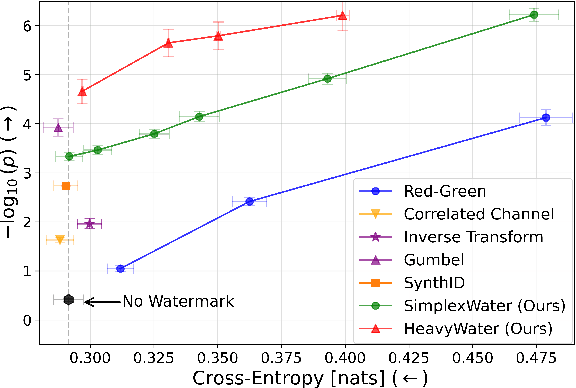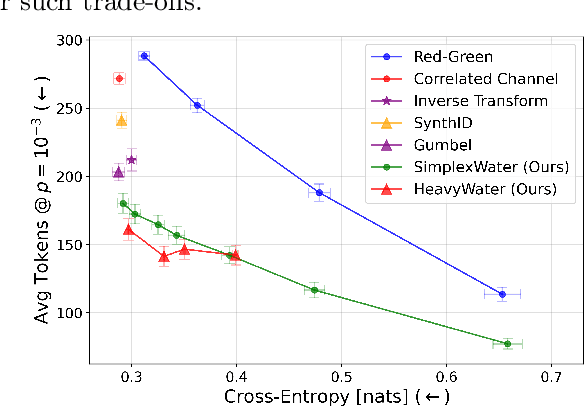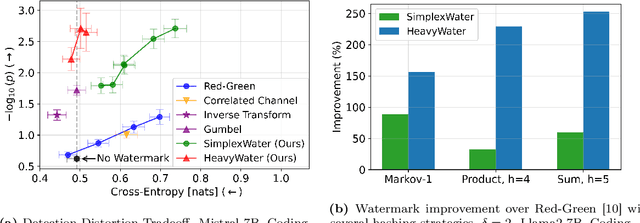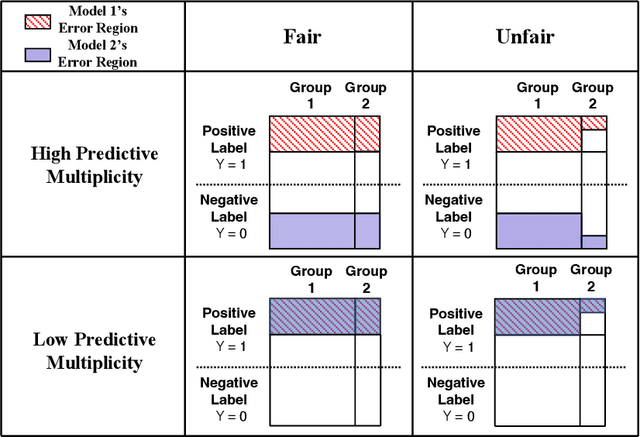Carol Xuan Long
HeavyWater and SimplexWater: Watermarking Low-Entropy Text Distributions
Jun 06, 2025



Abstract:Large language model (LLM) watermarks enable authentication of text provenance, curb misuse of machine-generated text, and promote trust in AI systems. Current watermarks operate by changing the next-token predictions output by an LLM. The updated (i.e., watermarked) predictions depend on random side information produced, for example, by hashing previously generated tokens. LLM watermarking is particularly challenging in low-entropy generation tasks - such as coding - where next-token predictions are near-deterministic. In this paper, we propose an optimization framework for watermark design. Our goal is to understand how to most effectively use random side information in order to maximize the likelihood of watermark detection and minimize the distortion of generated text. Our analysis informs the design of two new watermarks: HeavyWater and SimplexWater. Both watermarks are tunable, gracefully trading-off between detection accuracy and text distortion. They can also be applied to any LLM and are agnostic to side information generation. We examine the performance of HeavyWater and SimplexWater through several benchmarks, demonstrating that they can achieve high watermark detection accuracy with minimal compromise of text generation quality, particularly in the low-entropy regime. Our theoretical analysis also reveals surprising new connections between LLM watermarking and coding theory. The code implementation can be found in https://github.com/DorTsur/HeavyWater_SimplexWater
Optimized Couplings for Watermarking Large Language Models
May 13, 2025Abstract:Large-language models (LLMs) are now able to produce text that is, in many cases, seemingly indistinguishable from human-generated content. This has fueled the development of watermarks that imprint a ``signal'' in LLM-generated text with minimal perturbation of an LLM's output. This paper provides an analysis of text watermarking in a one-shot setting. Through the lens of hypothesis testing with side information, we formulate and analyze the fundamental trade-off between watermark detection power and distortion in generated textual quality. We argue that a key component in watermark design is generating a coupling between the side information shared with the watermark detector and a random partition of the LLM vocabulary. Our analysis identifies the optimal coupling and randomization strategy under the worst-case LLM next-token distribution that satisfies a min-entropy constraint. We provide a closed-form expression of the resulting detection rate under the proposed scheme and quantify the cost in a max-min sense. Finally, we provide an array of numerical results, comparing the proposed scheme with the theoretical optimum and existing schemes, in both synthetic data and LLM watermarking. Our code is available at https://github.com/Carol-Long/CC_Watermark
Multi-Group Proportional Representation
Jul 11, 2024Abstract:Image search and retrieval tasks can perpetuate harmful stereotypes, erase cultural identities, and amplify social disparities. Current approaches to mitigate these representational harms balance the number of retrieved items across population groups defined by a small number of (often binary) attributes. However, most existing methods overlook intersectional groups determined by combinations of group attributes, such as gender, race, and ethnicity. We introduce Multi-Group Proportional Representation (MPR), a novel metric that measures representation across intersectional groups. We develop practical methods for estimating MPR, provide theoretical guarantees, and propose optimization algorithms to ensure MPR in retrieval. We demonstrate that existing methods optimizing for equal and proportional representation metrics may fail to promote MPR. Crucially, our work shows that optimizing MPR yields more proportional representation across multiple intersectional groups specified by a rich function class, often with minimal compromise in retrieval accuracy.
Arbitrariness Lies Beyond the Fairness-Accuracy Frontier
Jun 15, 2023



Abstract:Machine learning tasks may admit multiple competing models that achieve similar performance yet produce conflicting outputs for individual samples -- a phenomenon known as predictive multiplicity. We demonstrate that fairness interventions in machine learning optimized solely for group fairness and accuracy can exacerbate predictive multiplicity. Consequently, state-of-the-art fairness interventions can mask high predictive multiplicity behind favorable group fairness and accuracy metrics. We argue that a third axis of ``arbitrariness'' should be considered when deploying models to aid decision-making in applications of individual-level impact. To address this challenge, we propose an ensemble algorithm applicable to any fairness intervention that provably ensures more consistent predictions.
 Add to Chrome
Add to Chrome Add to Firefox
Add to Firefox Add to Edge
Add to Edge